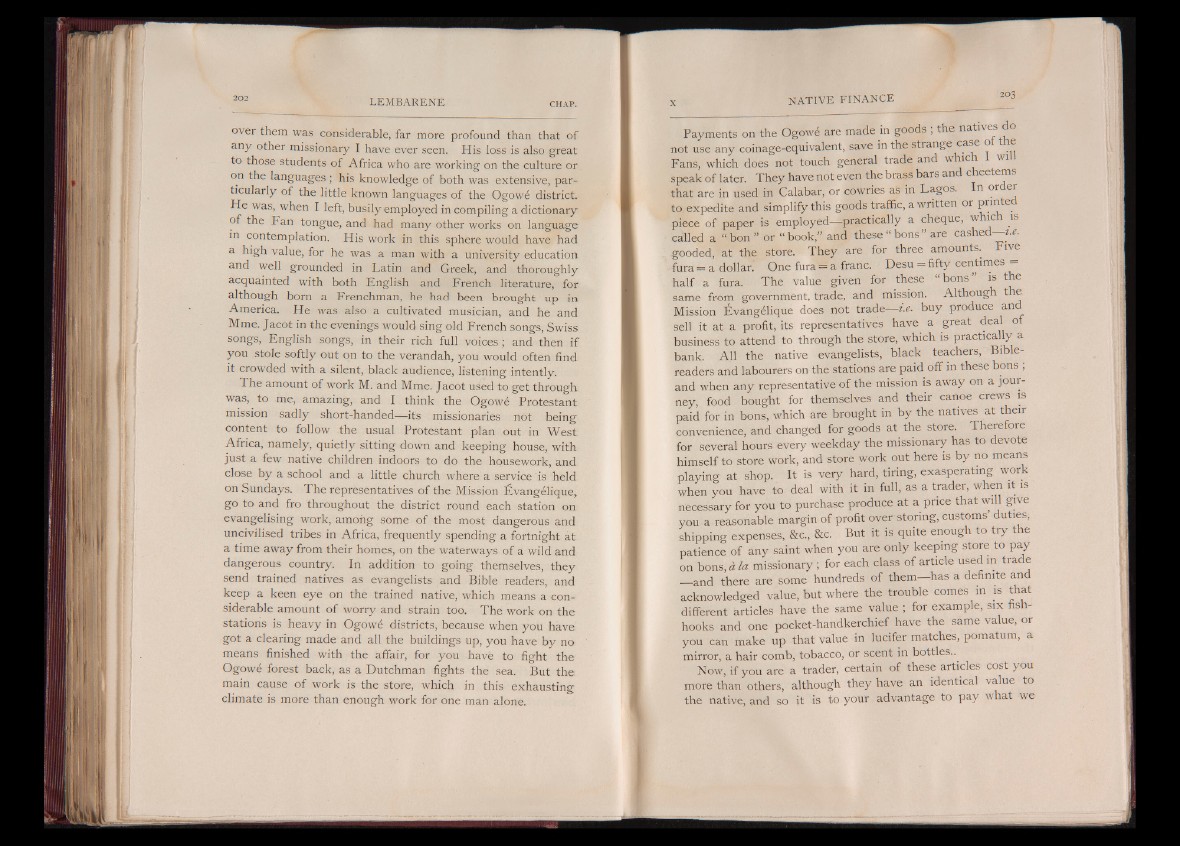
over them was considerable, far more profound than that of
any other missionary I have ever seen. His loss is also great
to those students of Africa who are working on the culture or
on the languages ; his knowledge of both was extensive, particularly
of the little known languages of the Ogowé district.
He was, when I left, busily employed in compiling a dictionary
of the Fan tongue, and had many other works on language
in contemplation. His work in this sphere would have had
a high value, for he was a man with a university education
and well grounded in Latin and Greek, and thoroughly
acquainted with both English and French literature, for
although born a Frenchman, he had been brought up in
America. He was also a cultivated musician, and he and
Mme. Jacot in the evenings would sing old French songs, Swiss
songs, English songs, in their rich full voices ; and then if
you stole softly out on to the verandah, you would often find
it crowded with a silent, black audience, listening intentlv.
The amount of work M. and Mme. Jacot used to get through
was, to me, amazing, and I think the Ogowé Protestant
mission sadly short-handed— its missionaries not being
content to follow the usual Protestant plan out in West
Africa, namely, quietly sitting down and keeping house, with
just a few native children indoors to do the housework, and
close by a school and a little church where a service is held
on Sundays. The representatives of the Mission Évangélique,
go to and fro throughout the district round each station on
evangelising work, among some of the most dangerous and
uncivilised tribes in Africa, frequently spending a fortnight at
a time away from their homes, on the waterways of a wild and
dangerous country. In addition to going themselves, they
send trained natives as evangelists and Bible readers, and
keep a keen eye on the trained native, which means a considerable
amount of worry and strain too. The work on the
stations is heavy in Ogowé districts, because when you have
got a clearing made and all the buildings up, you have by no
means finished with the affair, for you have to fight the
Ogowé forest back, as a Dutchman fights the sea. But the
main cause of work is the store, which in this exhausting
climate is more than enough work for one man alone.
Payments on the Ogowé are made in goods , the natives do
not use any coinage-equivalent, save in the strange case o t e
Fans, which does not touch general trade and which wil
speak of later. They have not even the brass bars and cheetems
that are in used in Calabar, or cowries as in Lagos. In or er
to expedite and simplify this goods traffic, a written or printe
piece of paper is employed— practically a cheque, w ic is
called a “ bon” or “ book,” and these“ bons” are cashed— zx
gooded, at the store. They are for three amounts. Five
fura = a dollar. One fura = a franc. Desu = fifty centimes -
half a fura. The value given for these “ bons” is the
same from government, trade, and mission. Although the
Mission Évangélique does not trade— i.e. buy produce and
sell it at a profit, its representatives have a great deal of
business to attend to through the store, which is practically a
bank. All the native evangelists, black teachers, 'Hlible-
readers and labourers on the stations are paid off in these bons ;
and when any representative of the mission is away on a journey,
food bought for themselves and their canoe crews is
paid for in bons, which are brought in by the natives at their
convenience, and changed for goods at the store. Therefore
for several hours every weekday the missionary has to devote
himself to store work, and store work out here is by no means
playing at shop. It is very hard, tiring, exasperating work
when you have to deal with it in full, as a trader, when it is
necessary for you to purchase produce at a price that will give
you a reasonable margin of profit over storing, customs duties,
shipping expenses, &c., &c. But it is quite enough to try the
patience of any saint when you are only keeping store to pay
on bons, à la missionary ; for each class of article used in trade
and there are some hundreds of them— has a definite and
acknowledged value, but where the trouble comes in is that
different articles have the same value ; for example, six fishhooks
and one pocket-handkerchief have the same value, or
you can make up that value in lucifer matches, pomatum, a
mirror, a hair comb, tobacco, or scent in bottles..
Now, if you are a trader, certain of these articles cost you
more than others, although they have an identical value to
the native, and so it is to your advantage to pay what we